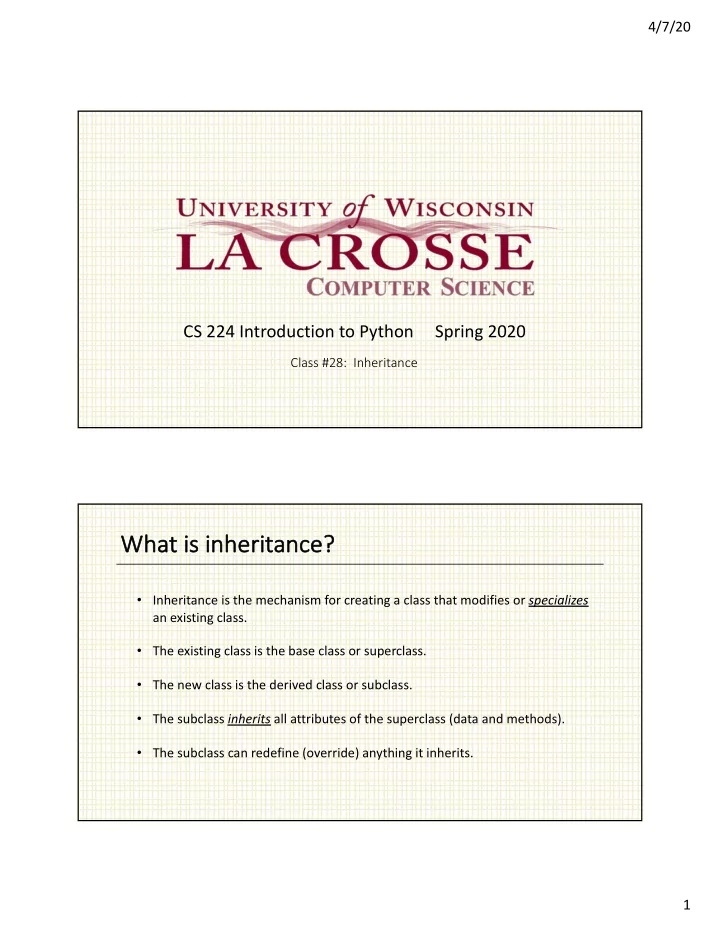

4/7/20 CS 224 Introduction to Python Spring 2020 Class #28: Inheritance Wha What is s inhe nheritanc nce? • Inheritance is the mechanism for creating a class that modifies or specializes an existing class. • The existing class is the base class or superclass. • The new class is the derived class or subclass. • The subclass inherits all attributes of the superclass (data and methods). • The subclass can redefine (override) anything it inherits. 1
4/7/20 Re Recall our Account class class Account(object): def __init__(self, name, balance): self.name = name self.balance = balance def deposit(self, amt): self.balance += amt def withdraw(self, amt): self.balance -= amt def inquiry(self): return self.balance A A class Derived from Ac Account class EvilAccount(Account): def inquiry(self): if random.randint(0, 4) == 1: overrides the method return self.balance * 1.25 in Account else: return self.balance 20% of the time, return an artificially high balance to “help” the account holder overdraw their account which increases fees paid to Wells Fargo the bank. 2
4/7/20 How does it work? An access (dot operator) of an attribute (data or method) for an instance of EvilAccount , looks first in EvilAccount . If the item isn’t found there, Python looks in the superclass, Account . It doesn’t stop there. If the item isn’t found in Account , Python looks in Account ’s superclass. This continues until reaching object , the root of the class tree. Ad Adding to EvilAccount class EvilAccount(Account): def __init__(self, name, balance, ef): Account.__init__(self, name, balance) self.evil_factor = ef Superclass __init__ defining a new attribute not automatically invoked. def inquiry(self): if random.randint(0, 4) == 1: return self.balance * self.evil_factor else: return self.balance 3
4/7/20 Cr Create an EvilAccount object checking2 = EvilAccount(‘Jane’, 10000, 1.1): checking2.inquiry() EvilAccount method checking2.deposit(100) checking2.inquiry() superclass method EvilerAccount class EvilerAccount(EvilAccount): def deposit(self, dep): self.withdraw(5) # convenience fee EvilAccount.deposit(self, dep) self must be provided here since no instance provided before the dot Explicit invocation of superclass deposit method 4
4/7/20 EvilerAccount A more general version: class EvilerAccount(EvilAccount): def deposit(self, dep): self.withdraw(5) # convenience fee super().deposit(dep) You don’t have to explicitly name the superclass NOTE: super() is Python3 specific Mu Multiple I Inheri ritance What is it? Allows a class to inherit features from more than one superclass. Why do we need it? Some types exhibit characteristics of multiple other types so extending them both is desirable/necessary. 5
4/7/20 Example An F22 Raptor is a fighter jet. It has some characteristics of a plane It has some characteristics of a weapon Plane alone doesn’t describe it because not all planes are weapons. Weapon alone doesn’t describe it because not all weapons are planes. Multiple I Mu Inheri ritance: Consider these two new classes related to Account : class DepositCharge(object): fee = 5 def deposit_fee(self): self.withdraw(self.fee) class WithdrawCharge(object): fee = 3 def withdraw_fee(self): self.withdraw(self.fee) 6
4/7/20 Mu Multiple I Inheri ritance: multiple inheritance Now we create a new account type: class MoreEvilerAccount(EvilAccount, DepositCharge WithdrawCharge): def deposit(self, amt): self.deposit_fee() super().deposit(amt) def withdraw(self, amt): self.withdraw_fee() super().withdraw(amt) Multiple I Mu Inheri ritance: Let’s use these new classes: d = MoreEvilerAccount(‘Tim’, 100000000, 1.2) deposit method of d.deposit(10) MoreEvilerAccount: d.inquiry() calls deposit_fee method of DepositCharge class inquiry method of EvilAccount 7
4/7/20 Hm Hmm, this this is is sub ubtle: tle: What’s going on here?: d = MoreEvilerAccount(‘Tim’, 100000000, 1.2) d.deposit_fee() DepositCharge.deposit_fee d.withdraw_fee() fee is $5 WithdrawCharge.withdraw_fee fee is…? $5 !!? Expl Explana nation • fee is a class variable. It is defined twice: once in DepositCharge and once in WithdrawCharge. • The value in DepositCharge was used in both calls. Why? Because the order of classes listed in the class definition for MoreEvilerAccount defines a priority. DepositCharge is listed before WithdrawCharge so it has higher priority. 8
4/7/20 Polymorphism What is it? Within the context of inheritance, ability to use an instance without regard to its type. Why do we need it? • To simplify implementations of subclasses: there is no need to override every attribute of superclass A in subclass B since instances of B can directly access attributes in A. • Allows passing object of subclass type B as a parameter when an object of superclass type A is expected (in general – doesn’t apply to Python) Polymorphism How does it work? It is handled entirely by the attribute lookup process. Consider class C that is a subclass of B . B is, in turn, a subclass of A . Let c be an instance of C . In a reference to c.attr , attr is searched in the following in this order: • instance c • class C • class B • class A • class object 9
Recommend
More recommend